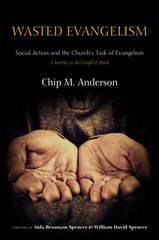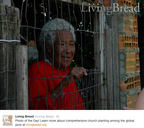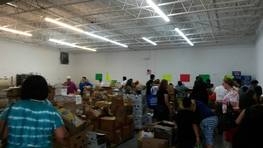|
I begin my book, Wasted Evangelism, Whenever someone attempts to redefine terms like “gospel” or “evangelism,” one must tread carefully for hallowed ground is being disturbed and sacred pillars are being moved.  I am fully aware, with my book and with this site, that I have entered a debate on the subject of evangelism and social action that has a history of polarizing positions, in which relationships can become strained or, all too often, severed. I recognize that I have made conclusions in Wasted Evangelism and will promote, even advocate, for positions, actions, and outcomes here on this site that will make many within my conservative and evangelical Christian family uncomfortable. My hope is, nonetheless, that the studies in Wasted Evangelism (for those willing to plough through its 6 studies) will cause many to dig deeper into the text, specifically the Gospel of Mark, to hear what the Bible says about the relationship between the gospel, evangelism, and social action. And, that the content of this site will provoke Christians and the Christian community to take up social action as a means to illustrate and realize that God’s kingdom has broken into time and space through the appearing of his Son, Jesus, the Messiah. The purpose of this site and the principles behind Wasted Evangelism is to connect Christians and churches . . .
0 Comments
Emil Brunner remarked, “For every civilization, for every period of history, it is true to say, ‘show me what kind of gods you have, and I will tell you what kind of humanity you possess.’” For the Christian and Christian community it is: Show me what kind of association you have with those living with the effects of poverty, and I will tell you what kind of god you worship.
*Quoted from the chapter “Idolatry and Poverty” in Wasted Evangelism.  Living Bread Ministries intentionally seeks to plant churches in global neighborhoods surrounded by poverty. Here is the mission and purpose in their own words . . . see Wasted Evangelism in Action page  I have been practicing a (mostly, pretty consistent) daily quiet time of prayer and Bible reading, now, just over thirty-seven years. I’ve read the Bible completely through at least thirty times in these QT hours over these years. And, yet, it took me until 2006, twenty-eight years since I began in 1978, to hear (read) that there is a relationship between my prayers, God hearing them, and my hearing the cries of the poor. Proverbs 21:13 points this out to us: "He who shuts his ear to the cry of the poor The writer of the proverb understood this from God’s first word to the Israelites just after their exodus out of Egypt and the giving of the ten-words (most call them the "ten commandments"). It did not take long after God had delivered Israel from the oppressive hand of Pharaoh to connect their existence to the widow, orphan, and the stranger (i.e., foreigner/alien). Moses indicated that association in his explanation of the ten-words: "You shall not wrong a stranger or oppress him, for you were strangers in the land of Egypt. You shall not afflict any widow or orphan. If you afflict him at all, and if he does cry out to Me, I will surely hear his cry; and My anger will be kindled, and I will kill you with the sword, and your wives shall become widows and your children fatherless" (Exodus 22:21–24). Actually the texts that followed the ten-words in Exodus 20 are filled with references to the poor and how God’s newly called and delivered people were to associate and treat them. There is a dynamic association between our relationship with God, and particularly our prayers, and our association with the poor. We are assured our own prayerful cries are heard by God when we hear the cries of the poor.
In my first interview after the release of Wasted Evangelism, I was asked: In The Hobbit, Gandalf tells Bilbo Baggins that if he does come back from his journey, he will not be the same – a quote you use. Has your journey to the start of this book changed you forever? I heard that dialog in the movie and I felt it best described the journey I have been on, not just in writing Wasted Evangelism, but in social action, a the journey I want others to take—a journey through the Gospel of Mark and entering paths that get them much closer to those living in poverty.
Wasted Evangelism is the result of a seven-year journey in Mark’s Gospel, seeking to determine the relationship of the gospel to the wider biblical material regarding poverty and justice. For me, this was no mere academic exercise alone, but a deeply spiritual one that made it clear to me that the church has a biblical responsibility to be intentionally involved in social action. For me, not only has social action been my profession, it has been an important part of my spiritual journey as well. Over these years I have come to realize there is a wide gap, a very unbiblical breach, between the issues of poverty and my evangelical Christian community. For many years I lived out my faith at the far “right” end of that gap. For the last sixteen years on the other side of this gap I have had the privilege of working with people dedicated to moving our economically vulnerable neighbors, often trapped in poverty, toward self-sufficiency. As a result of experiencing both ends of this gap, I often find myself alone in most any room I am in. Among my peers and colleagues in social action I am extremely conservative as an evangelical Christian, sometimes even politically suspect; among my conservative Christian family I am often viewed as too liberal regarding social action and the gospel, sometimes even borderline heretical. During the summer of 2006 I began to seek out my own biblical rationale for my new vocation in community action—I wanted some personal justification from God’s Word that my faith should be legitimately connected to my work in social action. Wasted Evangelism is a reflection of that search. As Gandalf said to Bilbo Baggins, I can’t guarantee a safe return—seriously the wading into the swamps, caves, rugged mountains, and precarious valleys (using Tolkien’s middle earth imagery) of the world of poverty is not safe. It is dangerous. The conditions themselves are not safe; the politics are not safe; the surrounding powers and wealthy will be chief in opposition, and they are not safe. Even the church itself will often be unfriendly while on the journey, nor will the church readily offer shelter. Self and status will have to be sacrificed. There is no guarantee of return. But if they, the poor rich readers, non-poor Christians, do return, they will certainly not be the same. __________ Michelle Snyder graciously provided my first interview upon the release of Wasted Evangelism: Social Action and the Church’s Task of Evangelism, on her blog, White Knight Studio. This post an excerpt from that interview.  For me, not only has social action been my profession for the last eighteen years, it has been an important part of my spiritual journey as well. Over these years I have come to realize there is a wide gap, a very unbiblical breach, between the issues of poverty and my evangelical Christian community. For many years I lived out my faith at the far “right” end of that gap. For the last sixteen years on the other side of this gap I have had the privilege of working with people dedicated to moving our economically vulnerable neighbors, often trapped in poverty, toward self-sufficiency. As a result of experiencing both ends of this gap, I often find myself alone in most any room I am in. Among my peers and colleagues in social action I am extremely conservative as an evangelical Christian, sometimes even politically suspect; among my conservative Christian family I am often viewed as too liberal regarding social action and the gospel, sometimes even borderline heretical. During the summer of 2006 I began to seek out my own biblical rationale for my new vocation in community action—I wanted some personal justification from God’s Word that my faith should be legitimately connected to my work in social action. My book, Wasted Evangelism, is a reflection of that search. This site is my attempt to connect Christians and churches to the issues of poverty, in hopes that the Christian community will engage these issues and become God's solution on behalf of our weakest, most vulnerable neighbors.  Joseph’s Storehouse needs Air Conditioning for its expanded warehouse. In America 40% of our food supply goes to waste. Joseph’s Storehouse seeks to remedy this and help our neighbors to alleviate their own food scarcity. Joseph's Storehouse is a non-profit food bank and co-op established in South Florida to supply food pantries and, as well, low-income single parents, individuals and families. The Storehouse has also donated over 37,000 pounds of food (over 18 tons!) in June alone to area food pantries, churches, and soup kitchens that do not have adequate resources or limited funding for their own food supplies. To date in 2015, they have been able to give away 84 tons of good, healthy food. Joseph’s Storehouse is able to support limited hours of operations from a minimum admin fee we collect, as well as, from small donations from our supporters. Our first space was originally 1,800 sq. ft., out-growing it in about 8 months. The present warehouse where our families, individuals, and feeding programs shop in has, now, doubled to about 3,600 sq. ft. In order to cool the larger facility for both the food and our shoppers, Joseph’s Storehouse requires the purchase and installation of least 2 four-ton condensers and air handlers. We are currently utilizing a used 4 ton condenser that was donated and we bought the matching air handler. Though thankful for this unit, it is insufficient to cool our current space here in South Florida. The cost of the new units is $9,800. Along with some current support on hand, we are seeking the remaining $7,900 to complete the project. Prayerfully and joyfully please consider giving to support our community efforts. And, if you are in the area, come see us if you haven't already! (See Joseph's Storehouse Facebook page.) Consider giving to Joseph's Storehouse air conditioner GoFundMe project |
AuthorChip M. Anderson, advocate for biblical social action; pastor of an urban church plant in the Hill neighborhood of New Haven, CT; husband, father, author, former Greek & NT professor; and, 19 years involved with social action. Archives
February 2024
Categories
All
|
Pages |
More Pages |
|

 RSS Feed
RSS Feed